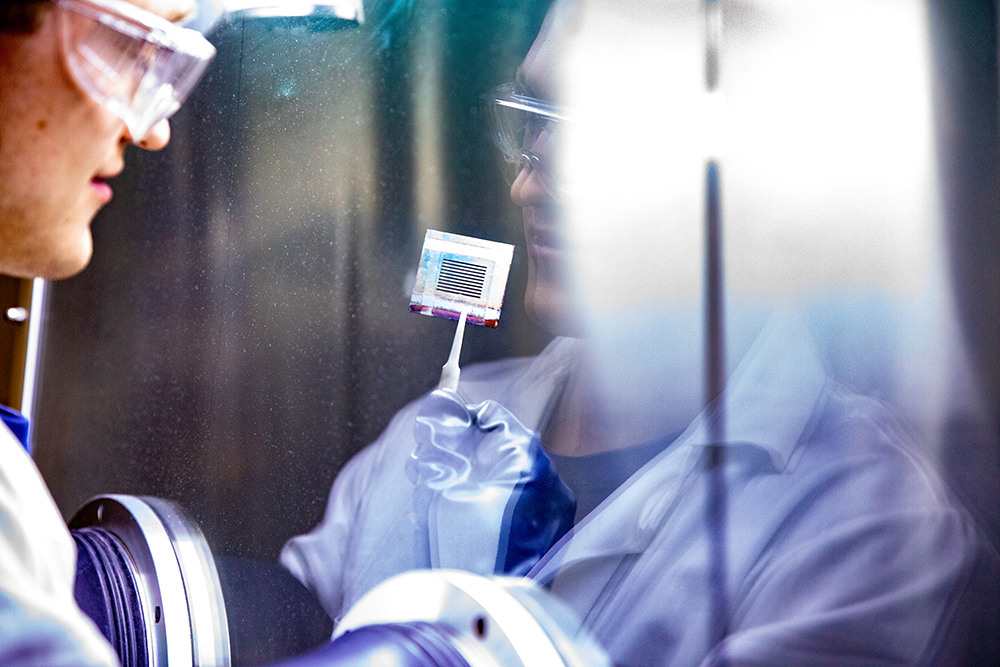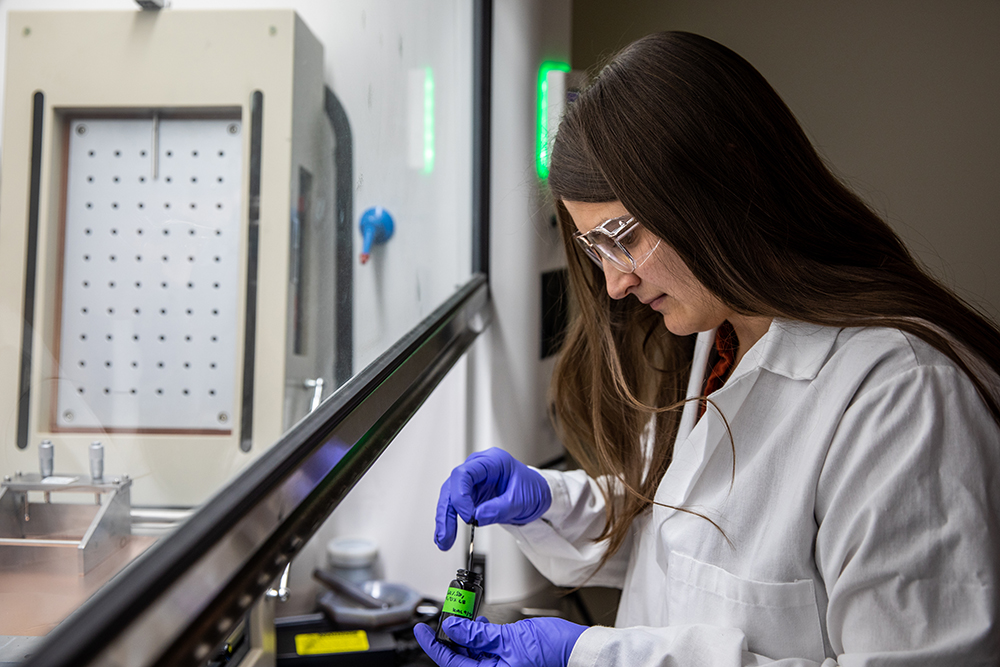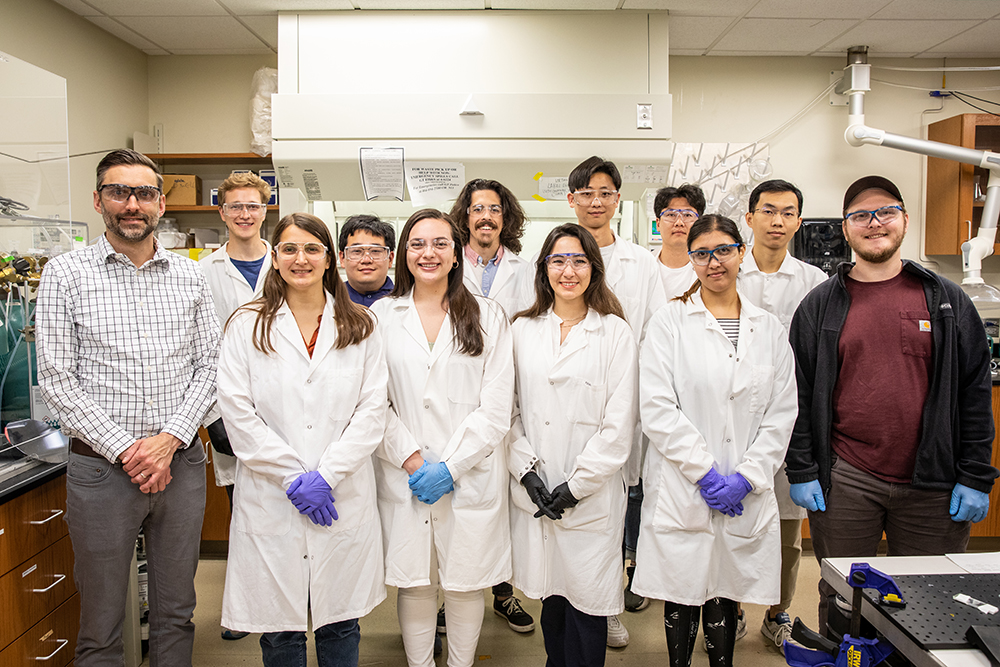
The McDowell Lab at Georgia Tech is Shaping the Future of Battery Technology
June 29, 2023
By Ian Sargent
Batteries. They come in numerous shapes, sizes, and lettered designations; they power everything from telecoms satellites to children’s toys; your TV remote goes through them too quickly and a dead one in your car will have you asking strangers for help.
Like so many items of convenience we only register the impact batteries have on our day-to-day life when they begin to falter. On most occasions these failures are at worst a nuisance, but as the number of hybrid and fully electric vehicles on the market grows, and as more economies aggressively pursue alternative fuel sources, the reliability and longevity of batteries will play a dominant role in how we create, store, and use energy.
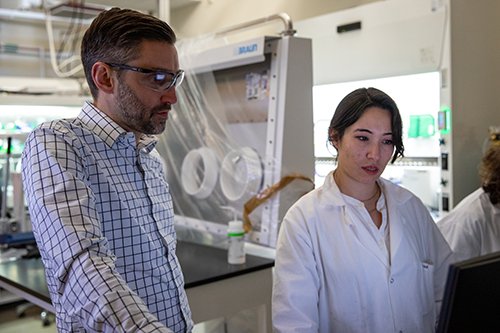 Researching new materials for the next generation of high-capacity batteries is Matthew McDowell, associate professor in the George W. Woodruff School of Mechanical Engineering and director of the McDowell Lab. By understanding how these different materials react to numerous charging cycles, his team hopes to help lead the charge toward longer-lasting batteries.
Researching new materials for the next generation of high-capacity batteries is Matthew McDowell, associate professor in the George W. Woodruff School of Mechanical Engineering and director of the McDowell Lab. By understanding how these different materials react to numerous charging cycles, his team hopes to help lead the charge toward longer-lasting batteries.
An Atlanta native, McDowell first took a serious interest in batteries as a graduate student at Stanford University.
“I figured that batteries would be a very important technology to enable widespread clean energy use and vehicle electrification,” McDowell says.
The complex materials used in batteries were another reason McDowell shifted his academic focus. Batteries have been constructed using a range of elements and minerals, from copper, zinc, lead, and even sulfuric acid. Nickel and lithium are two elements currently in use in lithium-ion batteries. Because of their high energy densities, lithium-ion batteries make up the bulk of batteries in consumer electronics, including those used in electric vehicles.
Still, researchers like McDowell and his team are looking for ways to improve energy density and long-term durability while reducing charging times, which remain obstacles in the electric vehicle market.
“Lithium-ion batteries are great,” McDowell says. “However, for cars that drive further on a charge, and for next-gen applications such as hybrid-electric aircraft, we need batteries that can store more energy. My group is working on new materials for batteries that can store more energy while being able to charge and discharge over many cycles.”
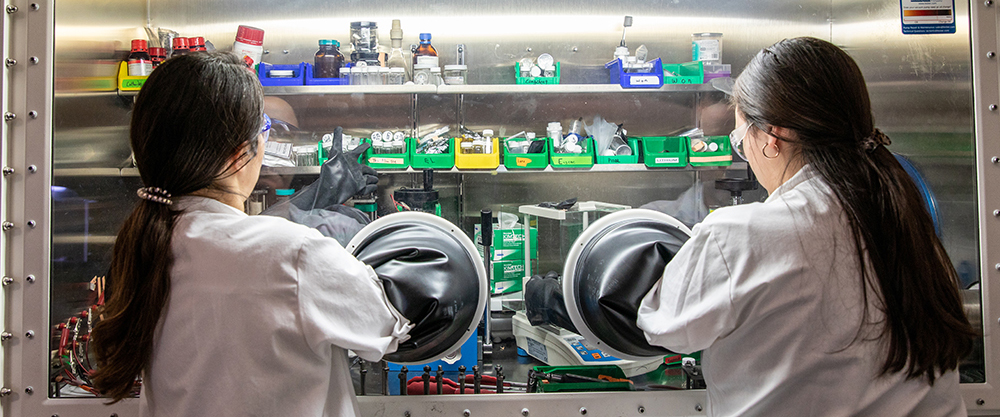
The group hard at work in the McDowell Lab consists of an affable team of 19 graduate students and post-doctorates.
Talia Thomas, a mechanical engineering Ph.D. student from Fort Meade, Maryland, joined the McDowell Lab in 2022 and has enjoyed the chance to fuse green chemistry and sustainable practices into battery science. She praised the positive lab culture and mentorship she’s received from colleagues and peers.
“[Professor McDowell], the postdocs and fellow grad students are always excited to share their knowledge and help me grow as a scientist and researcher,” Thomas says. “I feel empowered and supported to do cool science that benefits humanity.”
The lab has made recent progress studying solid-state battery technologies, which have even more energy density than lithium-ion batteries. Packed with a highly conductive non-volatile medium, solid-state batteries are seen as a safer and more powerful energy storage alternative.
“We have recently discovered the mechanisms that limit the performance of high energy electrode materials in solid-state batteries,” McDowell says. “We have also developed new electrode materials which can charge and discharge very fast – in other words, you wouldn’t have to wait long at a charging station to recharge your car.”
The research into solid-state batteries has helped Lars Nelson, a Ph.D. student in the McDowell Lab studying materials science and engineering. The Charleston, South Carolina native has been with the lab for two years and describes the works as “impactful” and of personal importance.
“Being in the lab has given me several awesome opportunities to lead and conduct research at multiple national lab facilities,” Nelson says. “That has resulted in some exciting data that will shape my Ph.D. going forward.”
Nelson plans on returning to the national lab setting to continue solid-state battery material research after completing his Ph.D. He’s also highly appreciative of the time and help he’s received in the lab, and says he’s become a much stronger researcher because of it.
A May report by the World Meteorological Organization indicated a 66% chance that global temperatures would increase beyond the 1.5 degrees Celsius limit set by the 195 national signatories of The Paris Agreement. As natural and manmade events drive climate imbalance, the potential impact of the research done by McDowell and his lab isn’t lost on anyone working there, including McDowell.
“I see batteries as a key part of enabling a clean energy future,” McDowell says. “Renewable energy, like solar and wind electricity, cannot be produced all the time, and cheap and efficient batteries are needed that can store renewable energy when it is produced so it can be used later. In addition, batteries enable the electrification of vehicles to avoid fossil fuel emissions. The next few years will see advances in batteries for all these applications, and I am particularly excited about new chemistries that are enabled by using solid-state battery technologies.”
